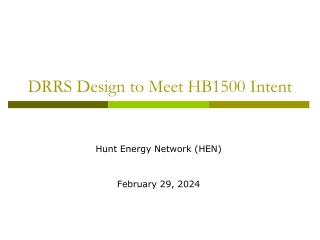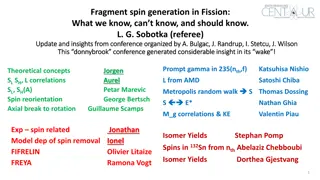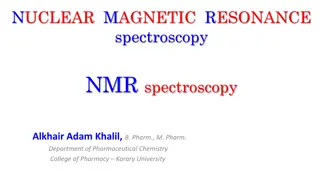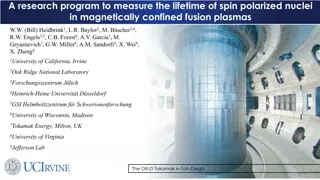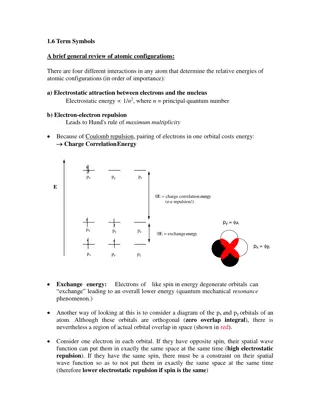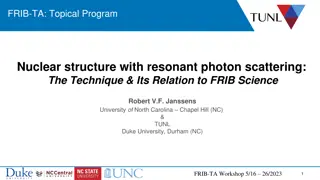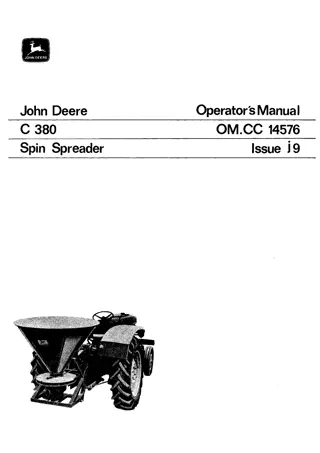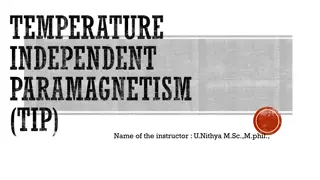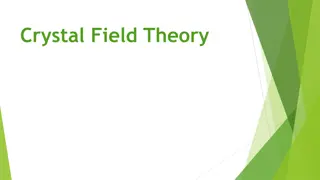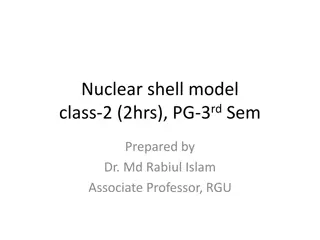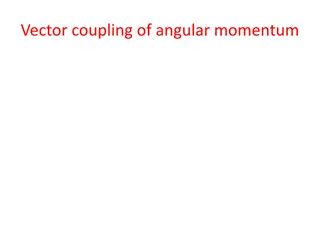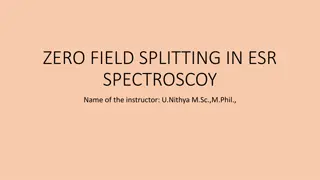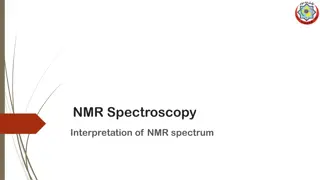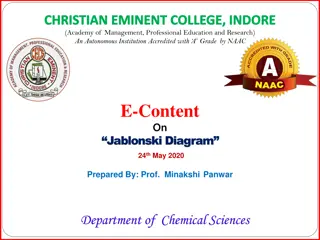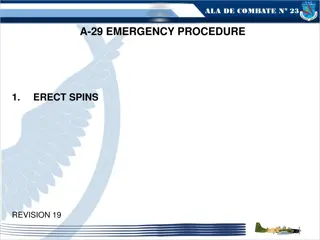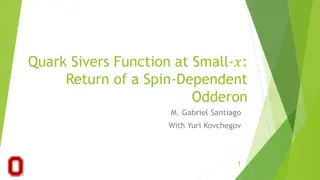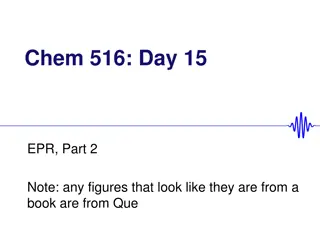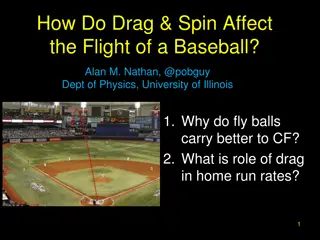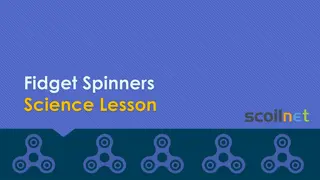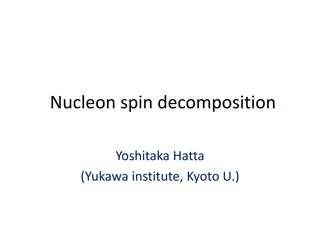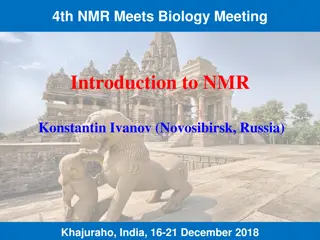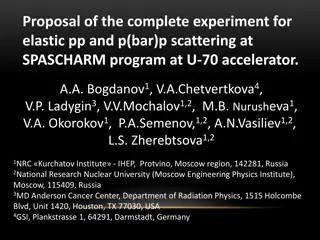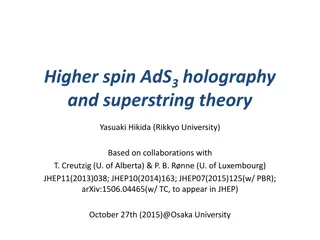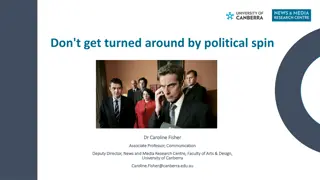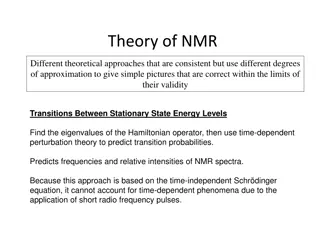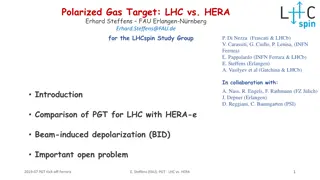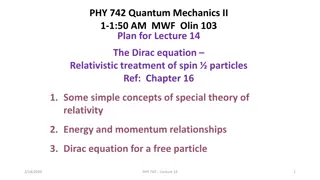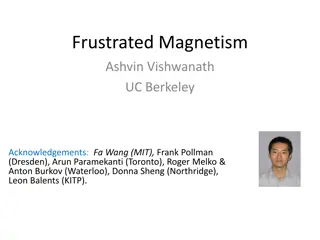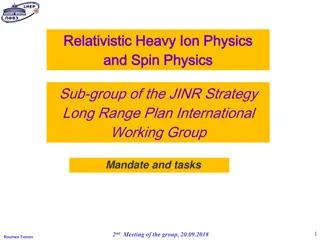Machine Learning Methods on 2D Ising Model
Key concepts in machine learning and the application of neural networks to infer temperature based on spin configurations of the Ising model.
1 views • 32 slides
Using the SPIN Funding Opportunities Database
Navigate the SPIN Funding Opportunities Database effectively with guidance from Karen Markin, Ph.D. Learn how to search by keywords, view results, and access program descriptions. Boost your grant-seeking success!
0 views • 15 slides
DRRS Design to Meet HB1500 Intent
The primary goal of the DRRS in line with HB1500 is to determine the quantity of services required based on historical variations in generation availability to uphold targeted reliability standards. The system must be able to shed firm load during extreme events, particularly severe winter storms, a
0 views • 6 slides
Insights on Fragment Spin Generation in Fission: What We Know
Considerable insight was generated from a recent conference on fission, shedding light on crucial theoretical and experimental aspects. Key topics include angular momentum, fission-fragment spin references, and the dynamics of nuclear fission. Theoretical advancements like the TDSLDA model and super
3 views • 41 slides
Principles and Applications of Symmetry in Magnetism Summer School Lecture
This lecture delves into the principles and applications of symmetry in magnetism, covering topics such as the symmetry of response tensors, transformations of tensors, time-reversal symmetry, and beyond point groups. It explores the symmetry of local effects, equivalent magnetic configurations, exp
2 views • 14 slides
Introduction to NMR Spectroscopy: A Powerful Tool for Structural Analysis
Nuclear Magnetic Resonance (NMR) spectroscopy is a vital technique in determining the structure of organic molecules. It complements IR and UV spectroscopies by providing a detailed map of the carbon-hydrogen framework. Understanding the physics behind NMR, such as nuclear spin and the effect of mag
6 views • 30 slides
Research Program on Spin Polarized Nuclei in Fusion Plasmas
Examination of spin polarized fuel in fusion plasmas to enhance energy production efficiency. Planned experiments aim to measure the lifetime of polarized nuclei for optimized fusion reactions. Key aspects include depolarization mechanisms, neutral beam heating, and fueling techniques with pellets.
1 views • 36 slides
Understanding AGN Jet Production Efficiency: Insights from Spin and Magnetic Flux
A fundamental question in astrophysics is how efficiently active galactic nuclei (AGN) produce jets. Black hole spin and magnetic flux play crucial roles in determining the jet production efficiency. High-spin values and large magnetic flux threading are essential for generating high-efficiency jets
2 views • 22 slides
Crystal Field Theory in Transition Metal Complexes
Crystal Field Theory (CFT) explains the colors and magnetic properties of transition metal complexes. It focuses on the energy changes in d-orbitals of metal ions caused by surrounding ligands. This theory, developed in 1929, provides insights into the bonding interactions in complex compounds. The
10 views • 44 slides
Understanding Atomic Configurations and Term Symbols
The energy of atomic configurations is determined by electrostatic attraction between electrons and the nucleus, electron-electron repulsion, spin-orbit coupling, and spin-spin interactions. Term symbols in electronic spectroscopy specify atomic states using quantum numbers. Hund's rule and the Paul
8 views • 12 slides
Nuclear Structure Investigations with Resonant Photon Scattering at FRIB-TA Workshop
Explore nuclear structure using resonant photon scattering at the FRIB-TA Workshop. The High Intensity Gamma-ray Source facility enables research on photonuclear reactions, spin and parity determinations, and selective investigation of nuclear states. Learn about the technique's potential impact on
2 views • 33 slides
Indian Restaurants Florida
Take a spin on India's rich culinary whe\u00adel right in the heart of Florida's buzzing dining are\u00adna. Indian eateries he\u00adre swirl you through the spice-sce\u00adnted lanes of the Indian subcontine\u00adnt. From Orlando's bustling lanes to Jacksonville's seaside\u00ad allure, these place\
0 views • 4 slides
John Deere C 380 Spin Spreader Operator’s Manual Instant Download (Publication No.OMCC14576)
Please open the website below to get the complete manual\n\n\/\/
0 views • 10 slides
John Deere C381 and C392 Spin Spreaders Operator’s Manual Instant Download (Publication No.OMCC16360)
Please open the website below to get the complete manual\n\n\/\/
0 views • 9 slides
Understanding Temperature Independent Paramagnetism (TIP) and Anomalous Magnetic Moments in Metal Ions
Temperature Independent Paramagnetism (TIP) explains the second-order Zeeman effect's magnetic susceptibility unaffected by temperature changes. Anomalous magnetic moments are observed in metal ions, deviating from predicted values based on electron angular momenta. The interaction of spin states in
1 views • 15 slides
Understanding Crystal Field Theory in Chemistry
Crystal Field Theory (CFT) explains how electron orbital degeneracies, particularly d or f orbitals, are affected by a static electric field generated by neighboring anions. In CFT, the metal ion is considered positive while ligands are negative charges, leading to attractive and repulsive forces af
0 views • 13 slides
Theoretical Derivation and Application of Nuclear Shell Model in Quantum Physics
The nuclear shell model, a fundamental concept in quantum physics, is explained in detail using Schrodinger wave equations and spherical coordinates. The model describes the behavior of nucleons in atomic nuclei based on energy values, quantum numbers, and shell closure principles. Spin-orbit intera
0 views • 14 slides
Understanding Angular Momentum in Quantum Mechanics
Exploring the concept of total angular momentum in quantum mechanics, which involves the quantization of orbital and spin angular momenta. The coupling of these vectors leads to the formation of total angular momentum, with implications for the behavior of single-electron systems like the hydrogen a
0 views • 16 slides
Understanding Zero Field Splitting in ESR Spectroscopy
Zero field splitting in ESR spectroscopy involves the relaxation times in ESR and how spin-lattice relaxation affects the spectral width. Discover how T1 value and spin lattice relaxation play a crucial role in observing sharp spectrum lines in EPR. Learn about line widths in ESR, spin dilution, and
0 views • 21 slides
spin class workout
Are you looking for an effective way to shed those extra pounds and boost your fitness level? Look no further than Spin Class Workout! At Cycle Bar, we are passionate about helping you achieve your weight loss goals through the power of Indoor Cyclin
1 views • 2 slides
Understanding NMR Spectroscopy and Chemical Shifts
Nuclear Magnetic Resonance (NMR) spectroscopy is a powerful technique for analyzing molecular structures based on the chemical shifts of protons. In an NMR spectrum, peaks correspond to different protons in a compound, with their positions, intensities, and spin-spin splitting providing valuable inf
0 views • 19 slides
The Benefits of a Daily 30
Spin workouts, also known as indoor cycling, are an excellent cardiovascular exercise. They help improve heart health, build muscle endurance, and burn calories. One of the most appealing aspects of spin workouts is their versatility.
2 views • 3 slides
Exploring Jablonski Diagram and Smart Teaching Tools at Christian Eminent College
Delve into the world of Jablonski Diagram through a comprehensive e-content prepared by Prof. Minakshi Panwar at Christian Eminent College, Indore. Understand energy states, spin, and spin multiplicity in molecules. Discover the concepts of absorbance, non-radiative transitions, and the conversion o
0 views • 11 slides
A-29 Emergency Procedure - Erect Spins Revision 19
Recognize an erect spin as an oscillatory movement about the three aircraft axes with high and low speed AOA. Follow the Corrective Action Procedures (C.A.P.) of throttle idle, full opposite rudder direction, and stick neutral. When the spins stop, maintain rudder neutral, adjust throttle and stick
0 views • 4 slides
30 minute spin workout
Stress management is essential for overall health. Regular physical activity, especially high-intensity workouts like spin classes, is known to reduce stress levels. A 30 Minute Spin Workout provides a concentrated burst of exercise that stimulates t
3 views • 6 slides
Understanding Quark Sivers Function and Spin-Dependent Odderon
Quark Sivers function, a key aspect in quantum chromodynamics, plays a role in capturing orbital angular momentum and spin-orbit coupling. Spin-dependent Odderon, an elusive three-gluon exchange, contributes to cross sections in high-energy collisions. Small-$? TMDs from polarized Wilson lines provi
0 views • 17 slides
Understanding Electron Paramagnetic Resonance (EPR) and Molecular Symmetry
The discussion covers the relevance and applications of EPR spectroscopy in studying electron behavior, spin-orbit coupling effects, and molecular symmetry. Key concepts include anisotropy, nuclear spin coupling, and deviations in electron g-factors. It delves into how these factors impact the obser
0 views • 11 slides
Impact of Drag and Spin on Baseball Flight
Understanding how drag and spin influence the flight of a baseball is crucial in explaining phenomena like why fly balls carry better to center field and how sidespin affects distance. Sidespin reduces distance by increasing drag, which competes with lift generated by backspin. The dependence of sid
1 views • 21 slides
Exploring Fidget Spinners: Science Lesson on Spin Time and Averages
Uncover the fascinating world of fidget spinners with a science lesson on spin time measurement techniques, calculating averages, and factors influencing spin time. Dive into hands-on activities, investigations, and discussions on materials used, bearing types, and spinner weights.
0 views • 28 slides
Understanding Nucleon Spin Decomposition and Proton Spin Problem
Explore the complex realm of nucleon spin decomposition and the enigmatic proton spin problem, delving into concepts like orbital angular momentum, quarks and gluons' helicity, and longitudinal double spin asymmetry in polarized deep inelastic scattering. Learn about the spin crisis, gluon polarizat
0 views • 26 slides
Understanding Spin Magnetism in NMR: An Introduction to Angular Momentum and Magnetic Moments
Delve into the world of spin magnetism in NMR as we explore the concepts of angular momentum, magnetic moments, Stern-Gerlach experiments, and the quantization of spin. Learn about spin projections, spin relaxation, and the relationship between spin particles and external magnetic fields.
0 views • 34 slides
Colorful Numbers and Spin! Tekhnologic Image Collection
Featuring various colorful numbers and a spin element, the Tekhnologic image collection includes images of green, yellow, blue, and red elements. The series showcases a playful and vibrant aesthetic, with each number highlighted in a different color. With a total of four sets, the collection offers
0 views • 1 slides
Investigation of Spin Observables in Elastic pp and p(bar)p Scattering at SPASCHARM Program
Measurements of spin observables in elastic pp and p(bar)p scattering at 16 GeV will be conducted at the SPASCHARM program using a unique setup with polarized proton and antiproton beams. The experiment aims to extend the energy range for spin studies and compare elastic scattering in pp and p(bar)p
0 views • 24 slides
Exploring Higher Spin AdS3 Holography and Superstring Theory
Delve into the fascinating world of higher spin gauge theory, Vasiliev theory, and their applications in AdS/CFT correspondence. Discover the complexity and tractability of higher spin states in superstring theory, as well as the concrete relations between superstrings and higher spin fields in AdS
0 views • 27 slides
Understanding Political Spin and Propaganda in Media
Explore the tactics of political spin and propaganda as tools used to shape public perception and manipulate information. Learn about the techniques politicians employ to navigate media dynamics and the covert spin tactics employed in the realm of communication and journalism.
0 views • 10 slides
Insights into Theoretical Approaches in NMR Spectroscopy
Theoretical approaches in NMR spectroscopy encompass diverse methods, each with varying degrees of approximation but yielding correct results within their validity. Techniques such as transition probabilities using the time-dependent perturbation theory, Zeeman interaction for energy level transitio
0 views • 32 slides
Comparing Polarized Gas Targets at LHC and HERA for Spin Studies
The comparison between Polarized Gas Targets (PGT) at the Large Hadron Collider (LHC) and HERA for spin studies is discussed. Key considerations such as beam-induced depolarization, beam parameters, and design aspects are highlighted. The importance of using a polarized gas target similar to HERMES
0 views • 15 slides
Relativistic Treatment of Spin Particles: Dirac Equation & Special Relativity
Exploring the Dirac equation for spin particles within the framework of special theory of relativity. Topics covered include energy-momentum relationships, basics of special relativity, Lorentz transformations, and relativistic effects on particles. The lecture delves into the interplay between quan
0 views • 23 slides
Understanding Geometric Frustration in Magnetism and Ice
Explore the concept of geometric frustration in magnetism and ice, where energetic requirements cannot be optimized simultaneously. Learn about frustrated magnetic insulators, quantum spin liquids, and the unique properties of geometrically frustrated systems such as triangular and Kagome lattices.
0 views • 25 slides
Relativistic Heavy-Ion and Spin Physics Sub-group Mandate and Tasks
The Relativistic Heavy-Ion and Spin Physics Sub-group, part of the JINR Strategic Long-Range Plan, is tasked with identifying scientific priorities and research infrastructure to maintain JINR's global scientific leadership. Members include experts from various institutions collaborating to develop
0 views • 8 slides


